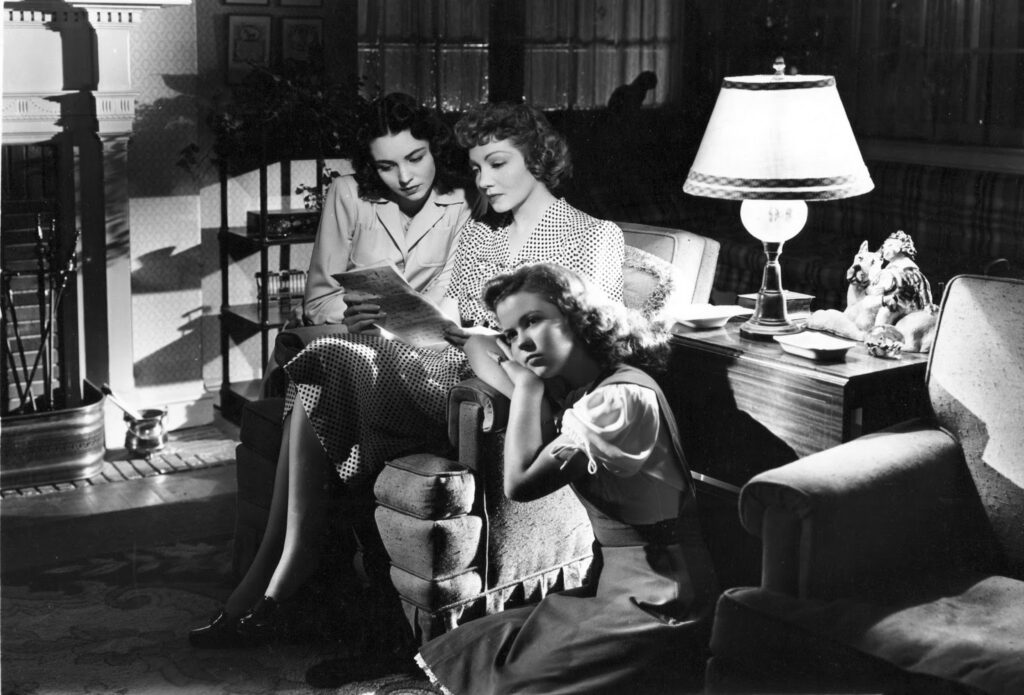
David O. Selznick’s production Since You Went Away (1944) is the essential wartime “weepie”. Selznick based the film on Since You Went Away: Letters to a Soldier from His Wife by Margaret Buell Wilder, turning the novel into a masterpiece of propaganda. Since You Went Away focuses on the homefront, directing it’s patriotic message at the women whose husbands, boyfriends, sons, and fathers went off to fight the Axis powers.
Since You Went Away presents its three female protagonists (played by Claudette Colbert with Jennifer Jones and Shirley Temple as her daughters) as idealized versions of their character types. Each of these women is a pillar of goodness and a shining example of what a patriotic woman should be doing to support the war effort. The plot may resemble Louisa May Alcott’s Little Women but all of the character idiosyncrasies and nuance is absent. Colbert, Jones and Temple are characters just not very human ones.
Wisely Selznick never introduces us to the husband/father character who has gone to war. He exists for the viewer only in the conversations of the characters in Since You Went Away. The viewer can only know him through his family. This invisible character is subject to the same idolization as the three female leads, though in the case of the latter that idolization comes from without rather than within the narrative. All of the other men (Joseph Cotten, Robert Walker, and Monty Woolley) that populate Since You Went Away are complex, multi-faceted characters with a distinct inner life. This discrepancy, in terms of realism, between the sexes is indicative of the film’s function as propaganda. Since You Went Away aspires to inspire and instruct women on how to live and act honorably during the war. Apparently the heroines cannot be burdened with the flaws, vices, and weaknesses of real people when so much depends on them.
And yet, Since You Went Away is a highly affective picture. The film exploits our romantic inclinations beautifully with regards to the screenwriting and John Cromwell’s direction. The performances by the entire ensemble are top notch as well with everyone bringing an intense emotionality to their characters. However what’s truly striking about Since You Went Away is Stanley Cortez’s cinematography. Like actors Joseph Cotten and Agnes Moorehead, Cortez came to Since You Went Away from Orson Welles’ The Magnificent Ambersons (1942). Cortez crafts some truly remarkable images with graphic, high contrast compositions that manage to evoke an entire act’s worth of drama in a single shot.
Parts of Since You Went Away are, of course, dated. The Hattie McDaniel character is typical of the time even if she is dealt with more respect than usual. For instance the manner with which she is written to speak is blatantly racist while the scene where Cotten gives her the gift of her portrait considers her as an actual human being. There is one moment in Since You Went Away that does stand out with regards to political correctness. During a montage of people hurrying through a train station, just before Jones and Walker say goodbye, there’s a brief shot of a Black army Sergeant walking with his family. In direct opposition of everything that the Hattie McDaniel character represents there is a depiction of a Black man and his family that is devoid of any overt or covert racism.
Since You Went Away opens in January 1943 and ends on Christmas Eve almost a year later. In that time tragedies are faced and overcome; friends are made and others lost; teenagers become adults. These simple narrative arcs, no matter how plastic their execution, never cease to have the cumulative effect of recreating a slice of life. This is why Since You Went Away is one of the great propaganda films. There’s more to this film than all of the posturing or sentimentality. There are grains of truth in the tableaus of Stanley Cortez and the performances of Claudette Colbert, Jennifer Jones, Hattie McDaniel, Monty Woolley, Joseph Cotten, and Robert Walker.
